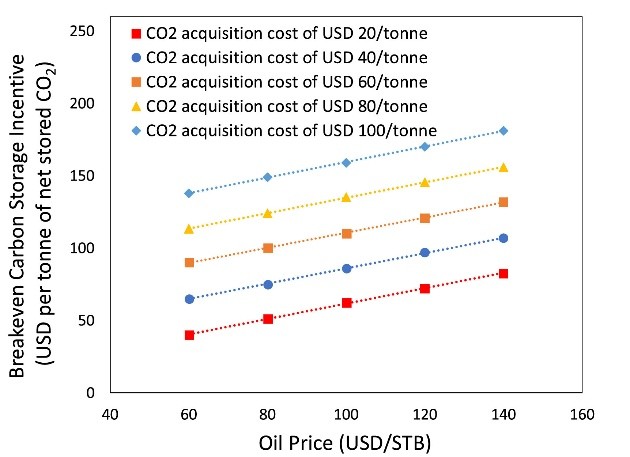A Novel Efficiency-based, Tiered Carbon Storage Incentive Approach for CCUS through CO2 Enhanced Oil Recovery and Storage
Abouzar Mirzaei-Paiaman, Larry W. Lake, and Lorena G. Moscardelli
International Journal of Greenhouse Gas Control, 2025, https://doi.org/10.1016/j.ijggc.2025.104362
Study Summary

Carbon Capture, Utilization, and Storage (CCUS) through CO2 Enhanced Oil Recovery (CO2-EOR) supports energy production while reducing atmospheric CO2 emissions. Economic profitability, not environmental effectiveness, typically drives operators’ decisions. The objective of this paper is to examine the relationship between economic and environmental benefits under various flood designs and economic conditions, proposing operational and policy solutions to simultaneously optimize both.
Our results show that without carbon storage incentives, economic and environmental gains are misaligned, with operators favoring practices that maximize net CO2 emissions. A dynamic breakeven carbon storage incentive, sensitive to oil prices and CO2 acquisition costs, is essential for alignment. Incentives below breakeven improve economic profitability with limited environmental gains. Operator responsibility for mitigating climate change, along with CO2 availability, also influences this alignment. Uniform incentive systems, such as the 45Q tax credit system in the U.S., present challenges, often requiring unrealistically high incentives and tying total incentives to the volume of net CO2 stored, rather than the actual environmental impact. To address these issues, we propose a novel alternative tiered, performance-based metric that directly links incentives to environmental outcomes through storage efficiency, defined as the amount of CO₂ effectively stored after accounting for upstream, gate-to-gate, and downstream emissions per barrel of oil produced.
Why is this research important and why do the results matter?
- We explore the relationship between the environmental and economic benefits of CO₂-EOR and identify strategies to maximize both simultaneously.
- We propose a new criterion for the design and structure of carbon storage incentive systems.
- We propose a novel tiered, performance-based metric that directly links carbon storage incentives to environmental outcomes through storage efficiency.
- We provide estimates for appropriate carbon storage incentive levels as a function of oil prices and CO₂ acquisition costs.
Link(s)
Mirzaei-Paiaman, A., Lake, L. W., and Moscardelli, L. G. 2025. A novel efficiency-based, tiered carbon storage incentive approach for CCUS through CO2 enhanced oil recovery and storage. International Journal of Greenhouse Gas Control, Volume 143, 104362, https://doi.org/10.1016/j.ijggc.2025.104362.